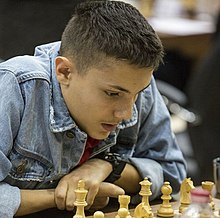Temur Kuybokarov
Temur Kuybokarov (formerly Igonin; born July 22, 2000) is an Uzbekistani-Australian chess player. He was awarded the title of Grandmaster by FIDE in 2019.[1] He qualified as a grandmaster at age 18 - the first from Western Australia - and then in 2020 became the first WA player to become Australian chess champion. Born in Tashkent,[2] he represented Uzbekistan until transferring to Australia in 2018.
| Temur Kuybokarov | |
|---|---|
 | |
| Country | Uzbekistan Australia |
| Born | July 22, 2000 Tashkent, Uzbekistan |
| Title | Grandmaster (2019) |
| FIDE rating | 2530 (August 2020) |
| Peak rating | 2523 (January 2020) |
Chess career
Kuybokarov was taught chess at the age of five by his mother and first coach, Tatyana Igonina.
At the age of 11, Kyubokarov (then Igonin) defeated World Champion Viswanathan Anand in a simultaneous exhibition, a feat which received worldwide attention.[3] Kuybokarov moved with his family to Australia in 2016 and lives in Perth, Western Australia.[4] He transferred his national federation from Uzbekistan to Australia in 2018.[5] He won the 2017 and 2019 Australian Open Championships.[6][7] Kuybokarov achieved the norms required for the title of Grandmaster in the following events: Australian Open 2017; Aeroflot Open 2017; and Gold Coast Open 2018. He also scored a fourth norm at the 2018 Abu Dhabi Masters.[8]
Kuybokarov is a chess professional and has won tournaments in Uzbekistan, Australia, China,[9] and Malaysia.[10]
In January 2019 Kuybokarov was named one of Western Australia's 50 Rising Stars.[11]
In December 2019 Kuybokarov won the 2019 Australian Masters Championship in Melbourne with a record-equalling 8.5/9 score.[12]
In January 2020 Kuybokarov won the Australian Chess Championship,[13] the first Western Australian player in the 135-year history of the event to win the title.
References
- "List of titles approved by the 2019 1st quarter PB in Astana, Kazakhstan". FIDE. 2019-03-11. Retrieved 2019-03-25.
- GM title application (PDF). FIDE.
- "For World Champion, Two Uncommon Losses". The New York Times
- https://thewest.com.au/news/wa/rising-stars-light-up-our-future-ng-b881067673z Rising stars: Meet the young West Australians lighting up our future
- Player transfers in 2018. FIDE.
- "2017 Australian Open Championship". www.newzealandchess.co.nz.
- "2019 Australian Open". www.boxhillchess.org.au.
- Title Applications. 1st quarter PB 2019, 4-6 March, Astana, KAZ. FIDE. Retrieved 2019-06-07
- "Chess-Results Server Chess-results.com - ASIAN YOUTH INVITATIONAL CHESS CHAMPIONSHIPS 2010". chess-results.com.
- "Chess-Results Server Chess-results.com - 8th Penang Heritage City International Chess Open 2016". chess-results.com.
- "Rising stars light up our future". The West Australian. January 18, 2019.
- "2019 Australasian Masters GM Norm Tournament". newzealandchess.nz.
- "Chess-Results Server Chess-results.com - 2020 Australian Championships". chess-results.com.